Equipping forest communities in the Tonle Sap Biosphere Reserve to fight forest fires
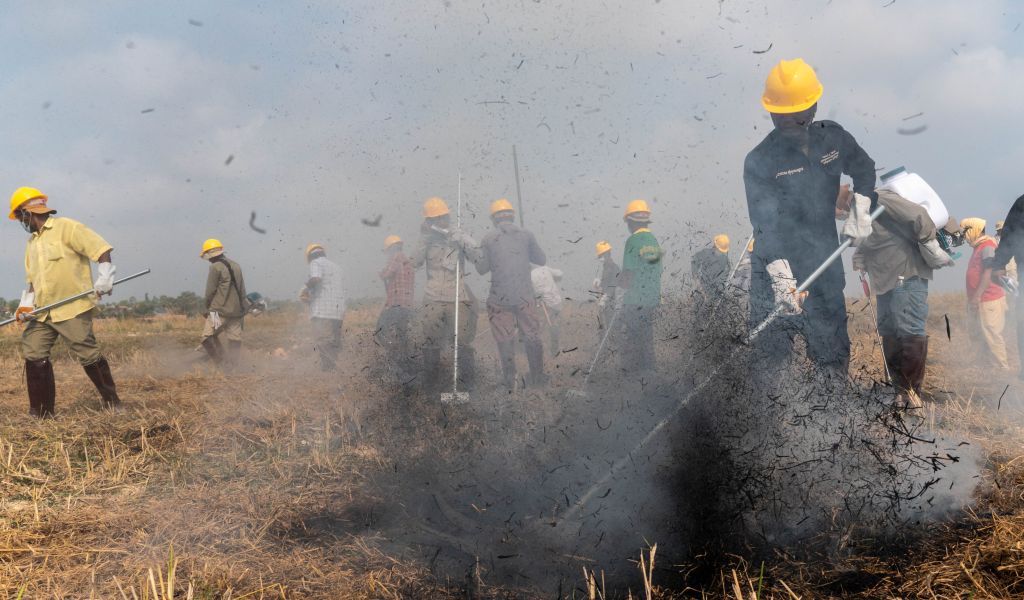
Community fisheries along the Tonle Sap Biosphere Reserve face wildfires threatening lives, livelihoods and biodiversity loss. In 2016, a huge fire burnt across multiple provinces. Media outlets at the time reported that the wildfires destroyed an estimated third of the seasonally flooded forests around the Tonle Sap Lake. As the fire raged, ill-equipped rangers and community members tried their best to control the wildfires and could only watch on. Almost a decade later, they still remember this tragedy vividly. Community members say they want to ensure they will never have to face the kind of loss they encountered that year and are currently engaged in community-based fire management.
RECOFTC's fire management initiatives
RECOFTC has over 25 years of experience in managing forest fires through community-based approaches in the region. “As a regional knowledge center, we have the mandate to document and share these practices across ASEAN countries to facilitate cross-country learning,” shares David Ganz, RECOFTC’s executive director and resident fire expert.
RECOFTC has been working with local communities in the Tonle Sap Biosphere Reserve to protect valuable forest and fishery areas from wildfires. The Community-based Fire Management (CBFiM) and Our Tonle Sap projects are working with nine community-based organizations in the two provinces adjoining the Tonle Sap Biosphere Reserve to manage forest fires.
These projects are providing communities with the knowledge, skills and resources to prevent and manage forest fires. Efforts have been made to ensure close collaboration with local governments, communities and stakeholders, leading to the development and implementation of community-based fire management plans tailored to each community fishery (CFi) and community-protected area. Additionally, efforts are underway to regenerate forests damaged by the 2016 wildfires.
Tep Thavrin, project coordinator for CBFiM in Cambodia, emphasizes the importance of understanding different fire types and providing appropriate interventions. He says, “Our training equips community members with foundational knowledge to complement their traditional practices in wildfire prevention.”
The projects have expanded capacity-building efforts through training and firefighting interventions. Nine target CFis across Pursat and Siem Reap provinces in Cambodia now use community-based fire management techniques to fight forest fires.
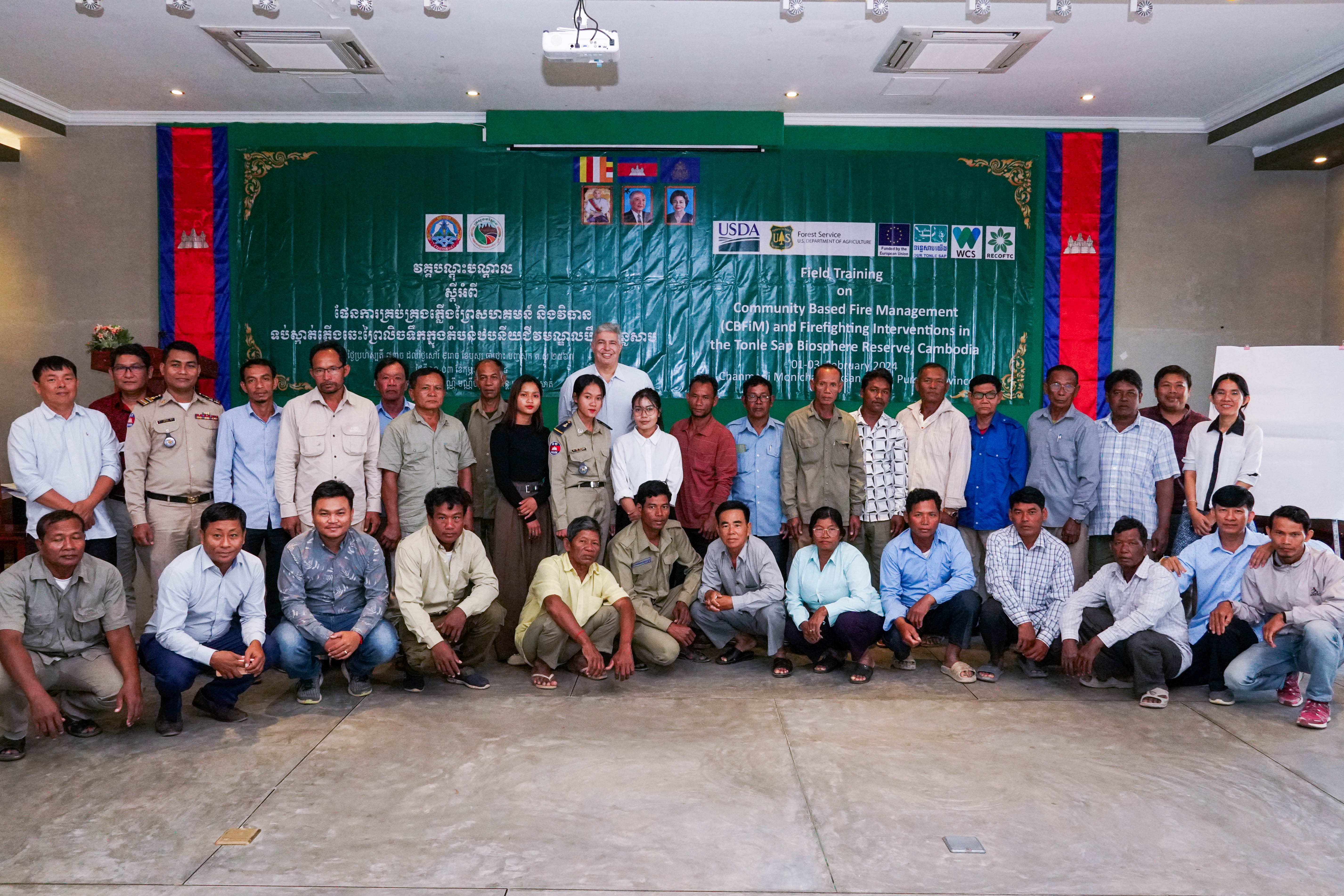
Across communities, there is an improved understanding of forest fire types and how they spread along with best practices in preparedness, intervention and safety. Awareness campaigns and capacity-building activities support community members as they implement their fire management plans, especially during the dry forest fire season from January to May.
Kirivuth Chhneang, RECOFTC Cambodia’s community forest partnership coordinator, says there is increased ownership of the community-based fire management plans. “We worked closely with CFi management committee members to develop and review these plans regularly,” he adds.
Capacity building and training
The projects have equipped community members with technical skills and resources tailored to the specific needs of their fire management interventions. These interventions, co-developed with each community, align with global approaches, particularly, the five Rs of FAO’s integrated fire management – review and analysis, risk reduction, readiness, restoration and response.
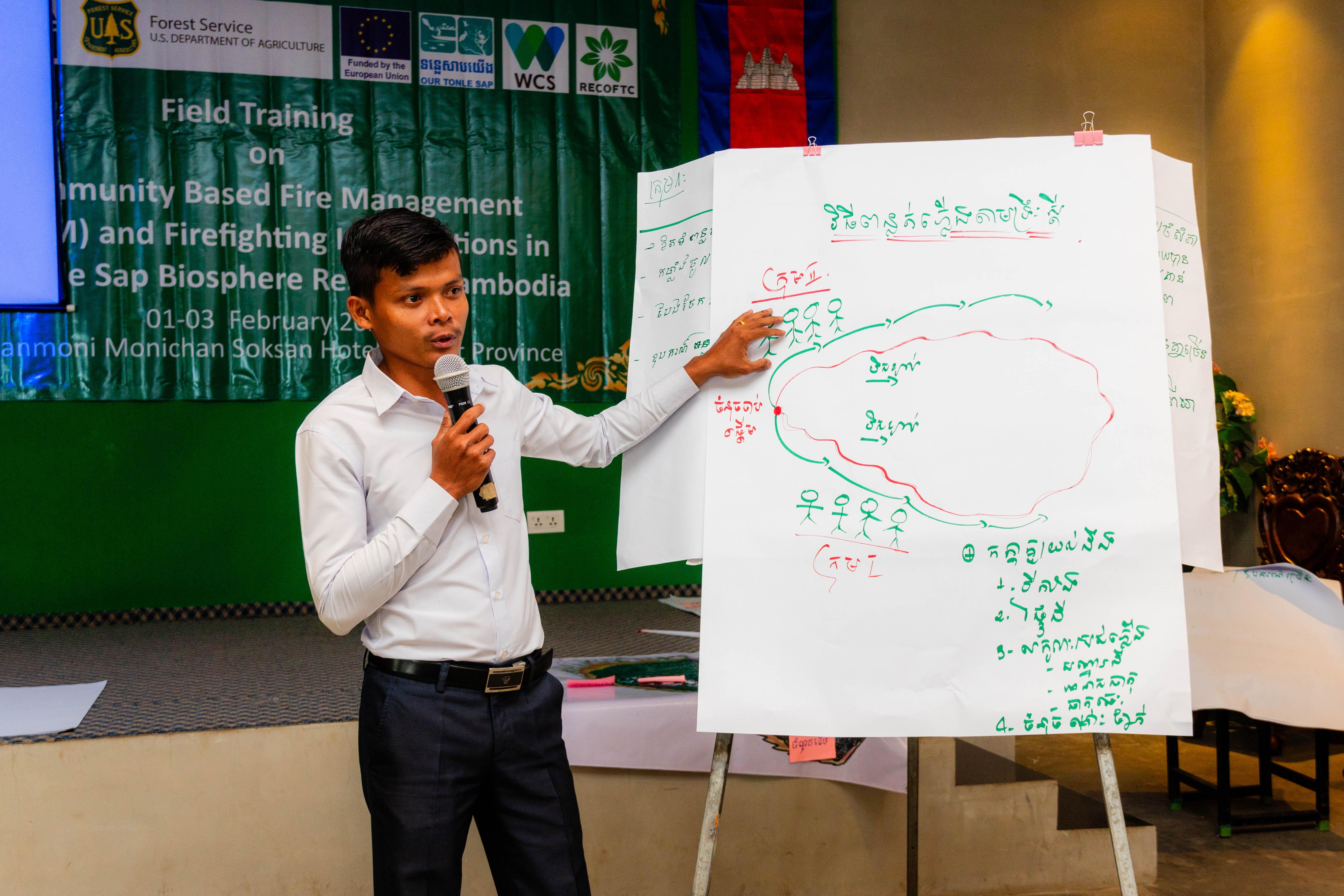
RECOFTC trainers, through participatory approaches, have worked with stakeholders to map fire-prone areas. They have trained participants in indirect combat methods like creating firebreaks and direct combat measures using tools like fire flappers, backpack sprayers and shovels to manage forest fires.
Incorporating appropriate technology
The introduction of the SMART patrolling mobile app, supported by the Wildlife Conservation Society, has further enhanced monitoring and response capabilities. Community members have also been trained on the use of the Telegram messaging application to disseminate timely forest fire alerts. They actively participate in sharing information and coordinating responses using the Telegram group.
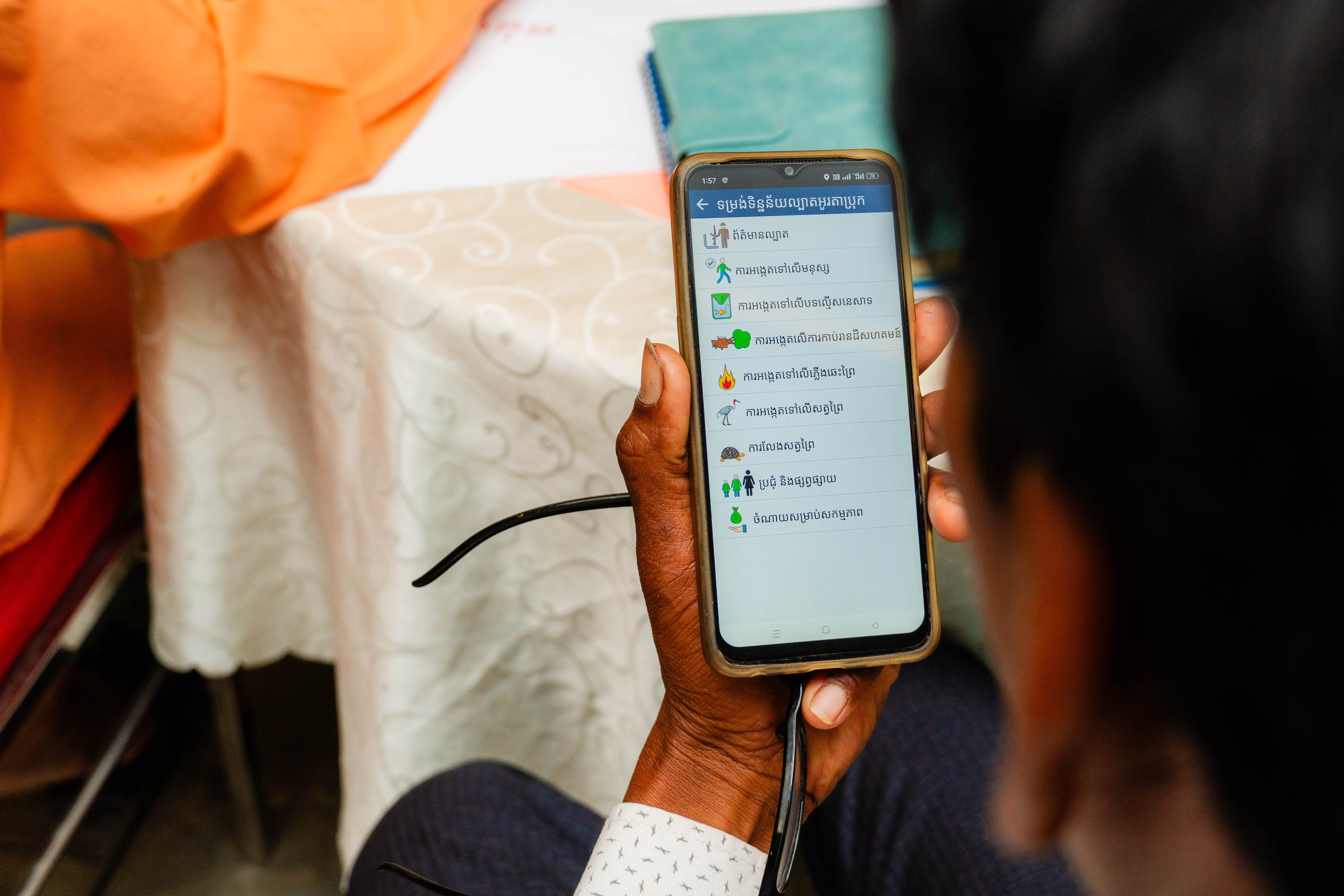
“Telegram is beneficial for us,” says, Sa Ya, chief of the Ou Ta Brok CFi. “Earlier, I had to make many phone calls to inform community members and request assistance, which was difficult and costly. Now, I just post in the Telegram group, and people are notified immediately and come to help.”
Prepping for the fire season
Ahead of the major fire season, between February and March this year, RECOFTC organized training, field practicums and equipment handovers for all nine community-based organizations. Just over 300 participants, 12 percent of them women, comprising representatives from the CBFiM groups and community forest firefighting groups and district forest firefighting groups participated in these trainings overall.
Joining the field practicum in Ou Ta Brok, Lay Viseth, Deputy Provincial Governor for Pursat Province thanked RECOFTC for organizing these trainings, awareness campaigns and equipment handovers. He requested that RECOFTC carry out additional activities including tree planting to benefit more communities and flooded forests.
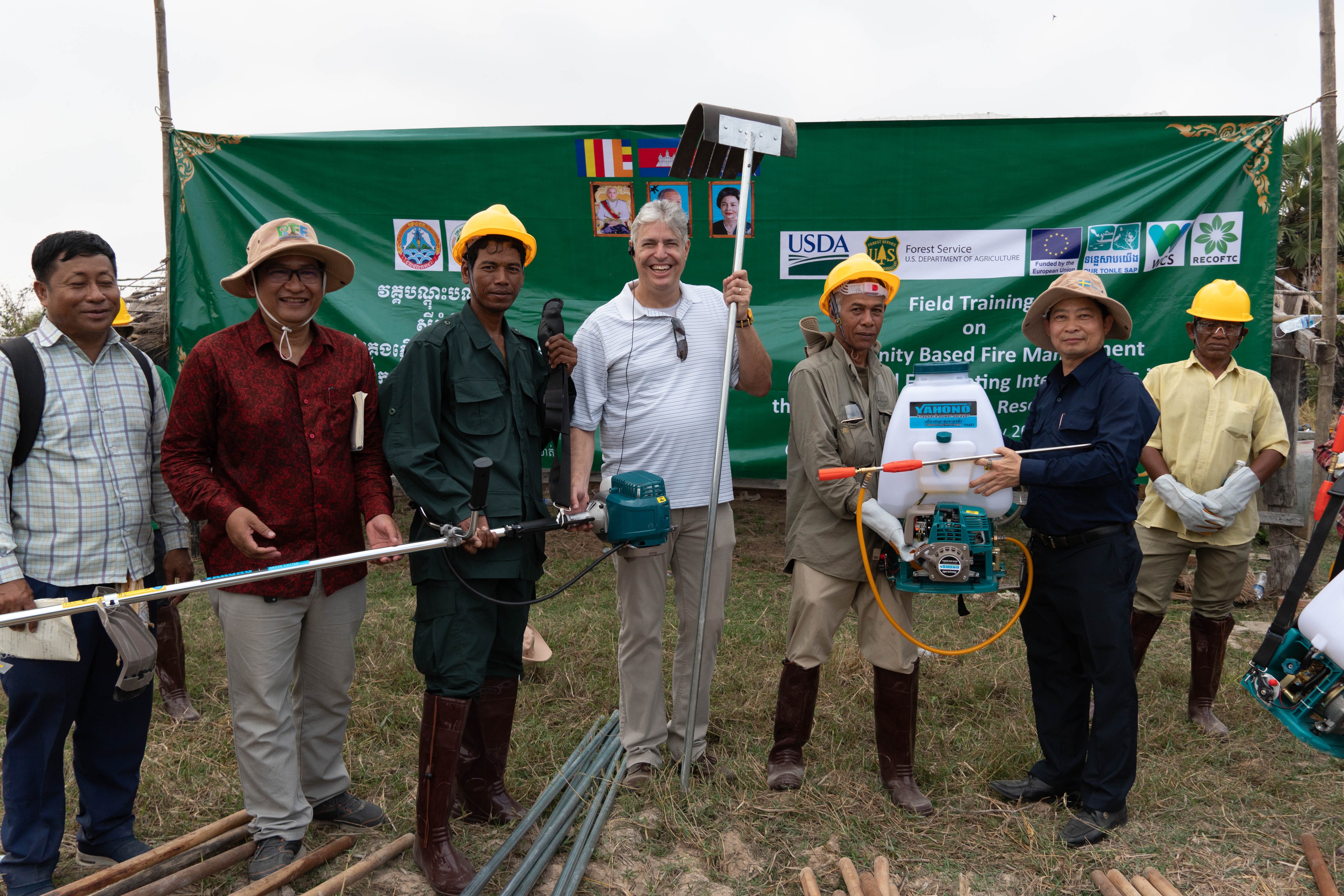
Women in fire management
“Protecting against forest fires is everyone's business. If women don't get involved and rely only on men who might be far away, serious fires can happen," says Khun Phalla, treasurer of the Ou Ta Brok CFi. Phalla has been a vocal advocate for women’s involvement in the training and field practicum for her CFi. She notes, “I was happy to have joined the training in Pursat. It is important that we are being introduced to different fire control tactics and fire safety measures.”
In January 2024, when a fire incident was reported in the Koh Preak Reang Til CFi, community members – men and women – equipped with firefighting materials and technical skills put it out in a timely manner. Interventions such as these are crucial to limiting the spread of forest fires. RECOFTC will continue working with communities to protect the Tonle Sap Biosphere Reserve and manage forest fires in the area.
###
Chansreyleak (Leak) Onn is project officer at RECOFTC Cambodia, Dy (Theara) Vutheara is communication and knowledge management officer at RECOFTC Cambodia and Utsav Maden is communication and engagement officer at RECOFTC.
This story/publication was produced through the Community-based Fire Management (CBFiM) in Asia and Our Tonle Sap projects.
The CBFiM project is made possible through a five-year cooperative agreement between the USDA Forest Service International Programs and RECOFTC. The project receives financial support from the United States Indo-Pacific Command (USINDOPACOM) of the Department of Defense, along with funding from USAID and the USDA Forest Service International Programs.
Our Tonle Sap project is funded by the European Union and led by the Wildlife Conservation Society (WCS). Project partners include RECOFTC, Sansom Mlup Prey (SMP), ForumCIV , Oxfam, NatureLife Cambodia, SHE Investment and Cambodian Disabled People's Organisation (CDPO). The partners are working closely with communities and the Ministry of Environment, Ministry of Agriculture Forestry and Fisheries, and the Fisheries Administration at all levels. The project is linked to a national forest fire prevention and management plan 2021-2025 by the Fisheries administration in Cambodia.
For more information, please visit www.recoftc.org/projects/cbfim and https://www.recoftc.org/en/cambodia/news/recoftc-launches-new-program-tonle-sap-biosphere-reserve-cambodia
RECOFTC’s work is made possible with the support of the Swiss Agency for Development and Cooperation and the Government of Sweden.

